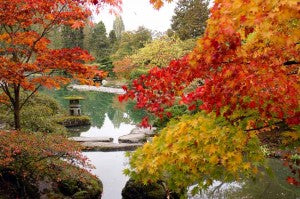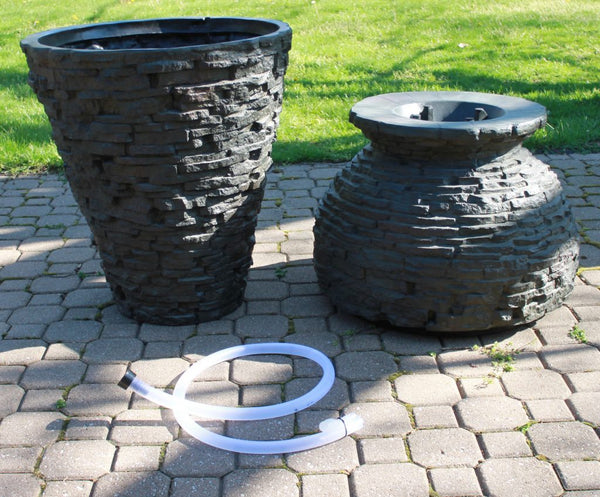Pond water quality is usually at its best in the fall because of fewer water battles with algae. Fall is also the one time of year where your pond may need daily maintenance.
Falling Leaves
Prepare the pond for the autumnal leaf fall by purchasing a fine-meshed pond net. Remove leaves before they have a chance to break down and pollute the water. If large quantities are left in your pond, they will decompose and rob your pond of oxygen. Don’t sweat if a few leaves get left behind in the pond. They can help provide overwintering places for frogs and insects. If you have a skimmer, you may need to empty the debris net daily. If you don’t have time for daily skimmer maintenance, consider purchasing a pond net to cover your pond entirely.
Plant Care
Plants will start to shed leaves quite dramatically as the temperature drops. Be attentive about removing any decaying leaf matter before it becomes detached and sinks to the pond bottom. Stop fertilizing your plants as well. Their nutritional requirements will be less as cooler weather begins. Hardy bog and marginal plants should be cut within 2 inches of the base of the water level. Water lilies should be trimmed back within 2-3 inches of the base of the plant. Tropical plants should be removed and brought indoors to over-winter, otherwise, they can be treated as annuals and replaced next year.
Fish Care
As the weather gets cooler, you will notice your fish spending more time at the bottom of the pond. Because pond fish are cold-blooded, their metabolism and appetite are dependent on the pond’s temperature.
As the water temperature drops to 65°F, start offering a lower-protein food. Marketed as cold water fish food or spring and autumn food, they offer low-protein and high wheat germ combinations. Wheat germ is a highly digestible protein. Higher-protein food should not be offered this time of year as they can only digest a limited amount of protein. The remaining protein is excreted as toxic ammonia, leading to water quality problems.
Stop feeding your fish when the temperature has reached 50°F. If you don’t have a pond thermometer, it’s a wise investment.
Winter Fish Care
In northern climates with extreme cold conditions, your pond can freeze over so it is important to maintain an opening in the pond so that fresh air and gas exchanges can occur. Decomposing organic matter can be exchanged with fresh oxygen. There are several ways that you can eliminate pond freeze-over.
A popular option is a floating pond de-icer. De-icers are designed to maintain a small hole in the pond ice. Most are thermostatically controlled to insure a worry-free solution for your pond fish.
Another option is to move your existing pond pump close to the water surface to create water movement. There are pumps that are marketed towards this very option. Aquascape markets their AquaForce® for this solution. Depending on the extremity of the weather, this option might be successful.
An overstocked pond can benefit from pond aeration. You may already have one located at the bottom of your pond. However, winter applications for pond aerators are not recommended to be placed on the bottom of the pond as this can disrupt the natural thermocline of the deeper portions of the pond. Most successful winter applications involve placing the aeration discs 1 to 1-1/2 feet below the water level. Always consult your owner’s manual for the manufacturer’s recommendation of winter applications.
You can also choose to run your pump throughout the winter. If you do choose this option, proper care should be taken to monitor your pond during the winter months to monitor water levels. Drops in water level could be due to evaporation or ice build-up. Ice build-up over the waterfall can lead to water being diverted out of the pond, leading to significant water loss. If this happens, consider removing the pump and follow manufacturer’s procedures on over-wintering the pump.
Winter Filter Media
If you choose not to run your pump, consider removing your filter media and, if possible, keep it moist or wet over the winter to retain the essential beneficial bacteria for next year.



